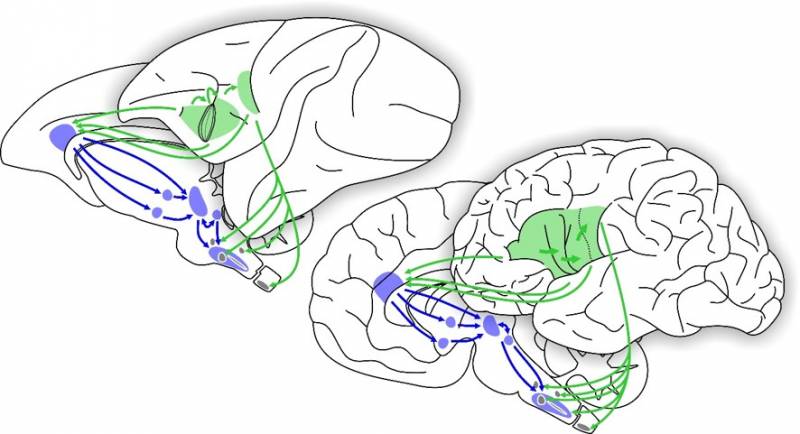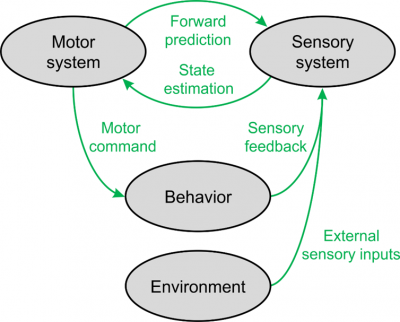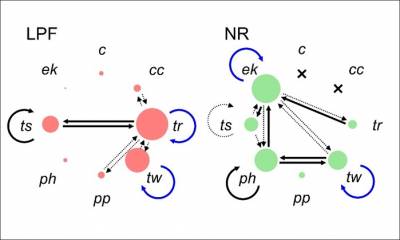Table of Contents
Social Communication
We aim to understand the neuronal mechanisms underlying social communication with a focus on vocal communication. The main goal of our research is to understand, how audio-vocal integration mechanisms are modulating vocal production and vocal perception as well as how cognitive and motivational processes are involved in vocal behavior. Furthermore, we investigate how developmental processes affect vocal output. We use combined psychophysical, neuroethological and neurophysiological methodologies to tackle our questions.
Senior Investigator: Prof. Dr. rer. nat. Steffen Hage

Phone: +49(0)7071-29 88898
steffen.hage@uni-tuebingen.de
Website: Hage Lab
Pubmed
Expertise
- Neural basis of vocal communication
- Cognitive control of vocal production
- Audio-vocal integration mechanisms
- Vocal perception
- Evolution of speech and language
Vocal production mechanisms
Few questions in biology are as difficult and controversial as the evolution of human speech and language, and the emergence of essential speech and language brain structures such as Broca's area in the lateral frontal lobe. This is because human language vastly outperforms any mammalian communication system in scope and flexibility, with seemingly no counterpart in the animal kingdom, even among hominids. Using a broad range of neurophysiological, neuroethological and psychophysical methodologies we aim to decipher the vocal production mechanisms in animals and humans. We are particularly interested in investigating building blocks of vocal communication system in animals that give ultimately rise to human speech.

Dual-Network Model. Anatomical locations and connections of the most relevant structures for vocal production in monkeys (left) and speech in humans (right). Modified from Hage & Nieder (2016, Trends in Neurosciences)
Collaborations
- Dr. Pascal Champeroux, European Biology Research Center (EBRC), Baugy, France
- Prof. Dr. Atsushi Nambu, National Intitute for Physiological Sciences, Okazaki, Japan
- Prof. Dr. Andreas Nieder, Animal Physiology, University of Tübingen
- Prof. Dr. Markus Siegel, Large Scale Neuronal Interactions, CIN, University of Tübingen
Audio-vocal Integration Mechanisms
The vocal motor system gets input from auditory structures on several brain levels to ensure proper vocal output. While audio-vocal integration is crucial for proper speech in humans as well as for animal vocalization, their underlying neural networks is yet poorly understood.
Using a broad range of neurophysiological, neuroethological and psychophysical methodologies we aim to decipher audio-vocal integration mechanisms in animals and humans. We are particularly interested in investigating the common and distinguishing principles of audio-vocal integration systems in animals and humans.

A highly simplified view of motor control. From Luo, Hage & Moss (2018, Trends in Neurosciences)
Collaborations
- Prof. Dr. Jinhong Luo, Central China Normal University, Wuhan, China
- Prof. Dr. Cynthia Moss, Johns Hopkins University, Baltimore, USA
Vocal Development
Vocalizations of human infants undergo dramatic changes across the first year by becoming increasingly mature and speech-like. Human vocal development is partially dependent on learning by imitation through auditory feedback between infants and caregivers. Consequently, deteriorations on vocal perception side such as congenital deafness or hearing loss lead to severe disturbances in speech production. Recent studies have revealed that vocal development is also influenced by parental feedback in a few mammalian species, suggesting similar vocal learning mechanisms.
We aim to investigate the role of auditory and social feedback on proper vocal development in animals and humans using a broad range of neurophysiological, neuroethological and psychophysical methodologies.

Influence of parental feedback during vocal development on call distribution and transition. Modified from Gultekin & Hage (2017, Nature Communications)
Collaborations
- Dr. Yasemin Gültekin, German Primate Center, Göttingen
- Dr. Kurt Hammerschmidt, German Primate Center, Göttingen
- Dr. David Hildebrand, Rockefeller University, New York, USA
Team
 |  |  |
| Steffen Hage | Elena Cavani | Deniz Dohmen |
| Prof. Dr. rer. nat. | MSc, Pharmacy | MSc, Cog. Neurosci. |
| Head of Research group | PhD student | PhD student |
 |  |  |
| Paula Handke | Julia Löschner | Yuta Tamai |
| Dentistry | PhD, Neurobiology | PhD, Engineering |
| MD student | Postdoc | Postdoc |
 |  |  |
| Vera Voigtländer | Yuhang Wang | Anna Wurm |
| MSc, Biology | BSc, Cogn. Sci. | MSc, Neurobiology |
| PhD student | Research assistant | Research assistant |
Alumni
Cristina Risueño Segovia, PhD
Anna-Lena Lutz, PhD